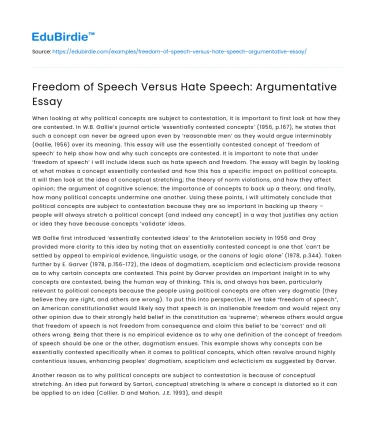When looking at why political concepts are subject to contestation, it is important to first look at how they are contested. In W.B. Gallie’s journal article ‘essentially contested concepts’ (1956, p.167), he states that such a concept can never be agreed upon even by ‘reasonable men’ as they would argue interminably (Gallie, 1956) over its meaning. This essay will use the essentially contested concept of ‘freedom of speech’ to help show how and why such concepts are contested. It is important to note that under ‘freedom of speech’ I will include ideas such as hate speech and freedom. The essay will begin by looking at what makes a concept essentially contested and how this has a specific impact on political concepts. It will then look at the idea of conceptual stretching; the theory of norm violations, and how they affect opinion; the argument of cognitive science; the importance of concepts to back up a theory; and finally, how many political concepts undermine one another. Using these points, I will ultimately conclude that political concepts are subject to contestation because they are so important in backing up theory – people will always stretch a political concept (and indeed any concept) in a way that justifies any action or idea they have because concepts ‘validate’ ideas.
WB Gallie first introduced ‘essentially contested ideas’ to the Aristotelian society in 1956 and Gray provided more clarity to this idea by noting that an essentially contested concept is one that 'can’t be settled by appeal to empirical evidence, linguistic usage, or the canons of logic alone' (1978, p.344). Taken further by E. Garver (1978, p.156-172), the ideas of dogmatism, scepticism and eclecticism provide reasons as to why certain concepts are contested. This point by Garver provides an important insight in to why concepts are contested, being the human way of thinking. This is, and always has been, particularly relevant to political concepts because the people using political concepts are often very dogmatic (they believe they are right, and others are wrong). To put this into perspective, if we take “freedom of speech”, an American constitutionalist would likely say that speech is an inalienable freedom and would reject any other opinion due to their strongly held belief in the constitution as ‘supreme’; whereas others would argue that freedom of speech is not freedom from consequence and claim this belief to be ‘correct’ and all others wrong. Being that there is no empirical evidence as to why one definition of the concept of freedom of speech should be one or the other, dogmatism ensues. This example shows why concepts can be essentially contested specifically when it comes to political concepts, which often revolve around highly contentious issues, enhancing peoples’ dogmatism, scepticism and eclecticism as suggested by Garver.
Save your time!
We can take care of your essay
- Proper editing and formatting
- Free revision, title page, and bibliography
- Flexible prices and money-back guarantee
Another reason as to why political concepts are subject to contestation is because of conceptual stretching. An idea put forward by Sartori, conceptual stretching is where a concept is distorted so it can be applied to an idea (Collier. D and Mahon. J.E. 1993), and despite often being recognised as a invalid definition of a concept, many people still stretch concepts to meet their criteria. This idea is ultimately based on interpretation and how one can interpret a concept to the point when it lacks specificity. By adapting concepts to fit a criterion (stretching the concept), the concept itself becomes more and more vague and much easier to contest. This idea is of course in terms of political concepts as, once again, a concept provides validity to a theory so will often be interpreted in a way that supports said theory. If we use the example of freedom of speech, the definition is as follows: “The right to seek, receive and impart information and ideas of all kinds, by any means.”. (Amnesty, 2018). In the US, one would say that this definition of freedom of speech is justification for verbal discrimination such as racism or homophobia, however in many European countries, freedom of speech would not be considered sufficient to justify racism or homophobia. This is because in the US the definition is taken for what it is under the 1st amendment. A very famous example of this is the 2011snyder vs Phelps supreme court verdict which ruled in favour of the infamous Westborough Baptist church’s picket lines outside of soldiers’ funerals. The Westborough Baptist church chants that God hates the US because of the country’s toleration of homosexuals (CBS, 2011). On the contrary, in the UK (and other European countries) the definition is ‘stretched’ to conform to the needs of society and protect groups from abuse – to conform to what is best for the people. In the UK laws are in place to entrench this interpretation of freedom of speech, such as the public order act of 1986 which outlines that there are certain protected characteristics including race, religion, disability, sexual orientation and transgender status (Gov.uk, 2020). Any verbal abuse based on these characteristics is deemed illegal. This is just one example of how concepts can be interpreted differently, thus allowing contestation over their definitions.






 Stuck on your essay?
Stuck on your essay?

